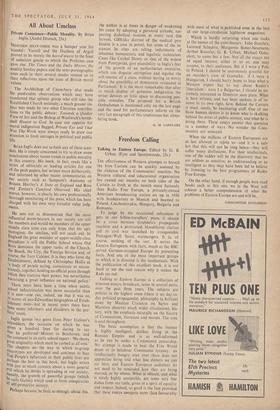All About Umclass
NINETEEN SIXTY-THREE was a bumper year for scandal: Vassall and the Duchess of Argyll proved to be merely the hors-d'oeuvre to the feast of salacious gossip to .which the Profumo case gave rise. The Times and the Daily Mirror, the quality Sunday papers and the semi-pornographic ones each in their several modes treated us to their reflections upon the state of British moral values.
The Archbishop of Canterbury also made his predictable observations which may have comforted that splinter group who still take the Established Church seriously; a much greater im- pact was made by two other Christian contribu- tions to the public debate: Towards a Quaker View of Sex and the Bishop of Woolwich's bomb- shell Honest to God. In case our appetite for moral indignation flagged, Private Eye and That Was The Week were always ready to draw our attention to fresh outrages in political and public life.
Brian Inglis does not re-hash any of these scan- dals. He is simply concerned to try to draw some conclusions about recent trends in public morality in this country. His book, in fact, reads like a series of editorials or leading articles for one of the posh papers, but written more deliberately, and informed by other recent commentaries on our society such as Sampson's Anatomy of Britain, Hartley's A State of England and Ross and Zimian's Camford Observed. His chief source, however, is clearly his own professionally thorough monitoring of the press, which has been charged with his own very foiceful value judg- ments.
He sets out to demonstrate that the most influential norm-bearers in our society are still the members and would-be members of the upper middle class (one can only hope that his ugly neologism, the umclass, will not catch on). In England the great moulder of upper-middle-class Prejudices is still the Public School whose Old Boys dominate the upper ranks of the Church, the Bench, the City, the Foreign Service and, of course, the Tory Cabinet. It is they who form the Establishment, defined by Christopher Hollis as a body of people acting, consciously or uncon- sciously, together, holding no official posts through Which they exercise their power, but nevertheless exercising a great influence on national policy.'
There must have been a time when public school indoctrination was more successful than It is now—one can, indeed, see that it was so, in scores of neo-Edwardian biographies of Estab- lishment men—but in recent years there have been many informers and dissidents in the pre- fects' room.
Inglis quotes two gems from Peter Ustinov's schooldays, the occasion on which he was given a hundred lines for daring to say that he preferred Mozart to Beethoven, and the comment in an early school report : 'He shows great originality which must be curbed at all cost.' The he chapters on the way in which in-group stereotypes are developed and continue to bias Top People's behaviour in their public lives are Perhaps the best in this book; but Inglis writes With just as much concern about a more general evil which he thinks is spreading in our society, /lamely, the growth of powerful groups (which be calls Guilds) which tend to form conspiracies of self-protective secrecy.
Perhaps because he feels so strongly about this, the author is at times in dangtr of weakening his cause by adopting a paranoid attitude, sus- pecting diabolical motives at every turn (his fervent, GBS-like distrust of the medical pro- fession is a case in point), but some of the in- stances he cites are telling indictments of inhuman bureaucratic and legalistic technicism. Cases like Crichel Down, or that of the widow from Pontypridd, give plausibility to Inglis's fear of 'the growth of an authoritarian executive, which can disguise corruption and legalise the self-interest of a class, without having to worry about the possibility of democratic resistance in Parliament.' It is the more remarkable that after so much display of generous indignation the writer devotes so little space to discussing pos- sible remedies. The proposal for a British Ombudsman is mentioned only on the last page and the need for parliamentary reform on the very last paragraph of this tendentious but stimu- lating book.
G. M. CARSTAIRS






























 Previous page
Previous page